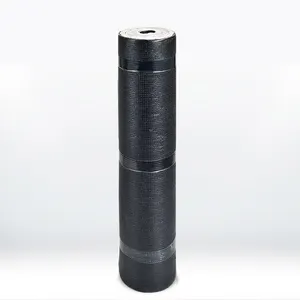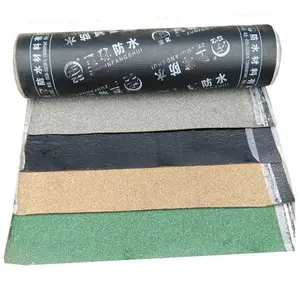

keyrone 4.0mm sbs modified bitumen waterproof membrane for roofing Prevent plant root puncture with pe rock aluminum foil film

Modified Bitumen waterproof membrane for road and bridge asphalt waterproofing China ROCKPRO factory





















A bitumen waterproof membrane is a pivotal component in construction, offering a protective barrier against moisture. This category encompasses a variety of membranes, including bituminous waterproofing, torch on waterproof membrane, and sbs waterproofing membrane, each designed to cater to different waterproofing needs. These membranes are essential for ensuring the longevity and durability of structures by preventing water ingress.
The application of bitumen waterproof membrane spans across various sectors. In residential and commercial buildings, it serves as a shield for foundations, basements, and roofs. The bituminous membrane is particularly favored for its adaptability, being suitable for both new constructions and refurbishment projects. In industrial settings, bituminous sheet waterproofing is commonly used due to its robust nature, providing long-term protection for large-scale facilities.
Bitumen waterproofing membranes are distinguished by their composition and manufacturing process. The APP membrane, a type of plastomeric waterproofing membrane, is modified with atactic polypropylene, making it more flexible at low temperatures. On the other hand, the SBS waterproofing membrane is enhanced with styrene-butadiene-styrene, giving it superior elasticity and thermal resistance. These materials are chosen for their ability to create a consistent and impervious barrier against water and moisture.
The advantages of using bituminous waterproofing coating and membranes are manifold. They offer excellent water resistance and adaptability to various surfaces, which is crucial for complex structures. The membrane torch method, a popular application technique, ensures a secure and homogenous bond to the substrate. Additionally, bitumen sheet waterproofing is known for its ease of installation and cost-effectiveness, making it a go-to choice for many contractors.
When selecting a bitumen waterproof membrane, it is important to consider the specific requirements of the project. Factors such as climatic conditions, surface type, and expected foot traffic will determine whether a more flexible membrane bitumen or a rigid solution is appropriate. The color and finish of the membrane also play a role in its aesthetic integration with the overall design of the structure.
Environmental sustainability and safety are also key considerations in the production and use of bitumen membrane sheet products. Recycled materials are increasingly utilized in the manufacturing process to minimize environmental impact. Furthermore, the industry is focused on ensuring that these waterproofing solutions meet stringent safety standards, contributing to the overall well-being of the construction ecosystem.